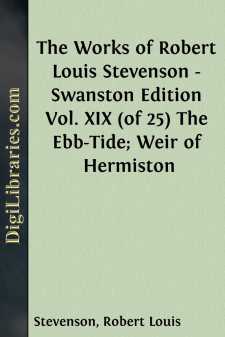Literary Collections
- American 84
- Ancient, Classical & Medieval 14
- Asian 1
- Australian & Oceanian 1
- Canadian 55
- Continental European 121
- English, Irish, Scottish, Welsh 179
- Essays 160
- General 24
- Letters 46
- Middle Eastern 1
Literary Collections Books
Sort by:
INTRODUCTION The circumstances which have made me responsible for selecting and editing the correspondence of Robert Louis Stevenson are the following. He was for many years my closest friend. We first met in 1873, when he was in his twenty-third year and I in my twenty-ninth, at the place and in the manner mentioned at page 54 of this volume. It was my good fortune then to be of use to him, partly by...
more...
by:
Andrew Lang
THE SURNAME OF STEVENSON From the thirteenth century onwards, the name, under the various disguises of Stevinstoun, Stevensoun, Stevensonne, Stenesone, and Stewinsoune, spread across Scotland from the mouth of the Firth of Forth to the mouth of the Firth of Clyde. Four times at least it occurs as a place-name. There is a parish of Stevenston in Cunningham; a second place of the name in the Barony of...
more...
by:
Andrew Lang
CHAPTER I THE ELEMENTS OF DISCORD: NATIVE The story I have to tell is still going on as I write; the characters are alive and active; it is a piece of contemporary history in the most exact sense. And yet, for all its actuality and the part played in it by mails and telegraphs and iron war-ships, the ideas and the manners of the native actors date back before the Roman Empire. They are Christians,...
more...
IN THE MARQUESAS It was about three o’clock of a winter’s afternoon in Tai-o-hae, the French capital and port of entry of the Marquesas Islands. The Trades blew strong and squally; the surf roared loud on the shingle beach; and the fifty-ton schooner of war, that carries the flag and influence of France about the islands of the cannibal group, rolled at her moorings under Prison Hill. The clouds...
more...
by:
Andrew Lang
VII October 1882—August 1884 In the two years and odd months since his return from California, Stevenson had made no solid gain of health. His winters, and especially his second winter, at Davos had seemed to do him much temporary good; but during the summers in Scotland he had lost as much as he had gained, or more. Loving the Mediterranean shores of France from of old, he now made up his mind to...
more...
by:
Andrew Lang
So much has been written on R. L. Stevenson, as a boy, a man, and a man of letters, so much has been written both by himself and others, that I can hope to add nothing essential to the world's knowledge of his character and appreciation of his genius. What is essential has been said, once for all, by Sir Sidney Colvin in "Notes and Introductions" to R. L. S.'s "Letters to His...
more...
A TALE OF A LION RAMPANT It was in the month of May 1813 that I was so unlucky as to fall at last into the hands of the enemy. My knowledge of the English language had marked me out for a certain employment. Though I cannot conceive a soldier refusing to incur the risk, yet to be hanged for a spy is a disgusting business; and I was relieved to be held a prisoner of war. Into the Castle of Edinburgh,...
more...
CHAPTER I NIGHT ON THE BEACH Throughout the island world of the Pacific, scattered men of many European races, and from almost every grade of society, carry activity and disseminate disease. Some prosper, some vegetate. Some have mounted the steps of thrones and owned islands and navies. Others again must marry for a livelihood; a strapping, merry, chocolate-coloured dame supports them in sheer...
more...
by:
Andrew Lang
Returning from Sydney at the end of October 1890, Stevenson and his wife at once took up their abode in the wooden four-roomed cottage, or “rough barrack,” as he calls it, which had been built for them in the clearing at Vailima during the months of their absence at Sydney and on their cruise in the Equator. Mr. Lloyd Osbourne in the meantime had started for England to wind up the family affairs at...
more...
by:
Andrew Lang
JOHN AMEND-ALL On a certain afternoon, in the late spring-time, the bell upon Tunstall Moat House was heard ringing at an unaccustomed hour. Far and near, in the forest and in the fields along the river, people began to desert their labours and hurry towards the sound; and in Tunstall hamlet a group of poor country-folk stood wondering at the summons. Tunstall hamlet at that period, in the reign of old...
more...











